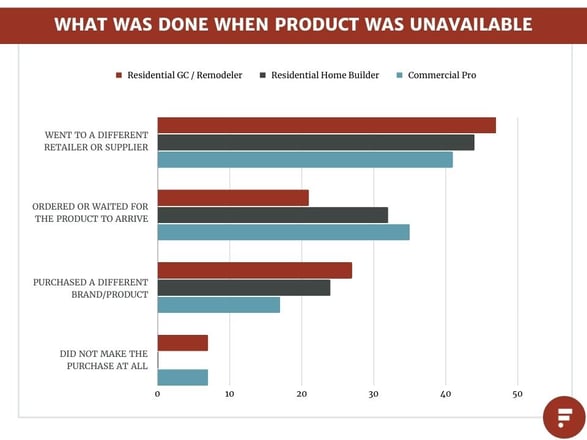Looking for a competitive advantage? For those in the building material industry, the key may lie in how you manage your inventory. With market dynamics in flux, and retailers eyeing expense reduction, potential sales opportunities could be slipping through the cracks.
The 2024 Building Products Consumer Report, published by the Farnsworth Group, highlights the importance of having a product in stock if you want to make the sale. According to the report on product availability:
- Approximately 50% opt to visit a different retailer or supplier.
- 25% percent either place an order and wait for the product to become available or purchase a different brand or product.
- Very few decide against making the purchase altogether. This is largely due to the genuine need for these materials to complete projects.
Despite the ongoing challenges, building product manufacturers and suppliers can sustain robust sales throughout 2024 by anticipating shifting customer demands and understanding their customer base and the evolving housing market.
.png?width=452&height=301&name=Email%20Blast%20Hero%20(2).png)
These 3 tips can help retailers manage inventory:
1. Carry High Demand Products: One of the most common mistakes is carrying too many products rather than focusing on the core products that are always in demand. You can obtain this information from historical sales data, talking with your customers about upcoming projects, and asking your supplier for market data. This information will help reduce the amount of inventory you keep on the ground which will increase sales and cash flow.
2. Open Communication with Your Supplier: The right relationships make the difference. Sharing market information may help your supplier keep up with demand so you can win more jobs. Your supplier can also provide better lead time data to help you plan inventory cycles so you don't have to overstock at any point. The key is communication and it's a two-way street.
3. Ask Suppliers for Leads: If you're stocking a product, your suppliers should be able to send you business opportunities they receive. When we receive leads, we share them with Authorized Dealers that are likely to have material in stock to help get the job going. Transparent inventory levels help this process and your supplier should be taking stock (couldn't resist) of what's available so they can help sell it if the opportunity arises.
Mismanaging inventory is costly by both missing sales and having excess material on the ground. Work with your suppliers and customers to understand the market demand so you can win more business in a competitive market.




-2.png?width=150&height=150&name=Untitled%20design%20(2)-2.png)
COMMENTS